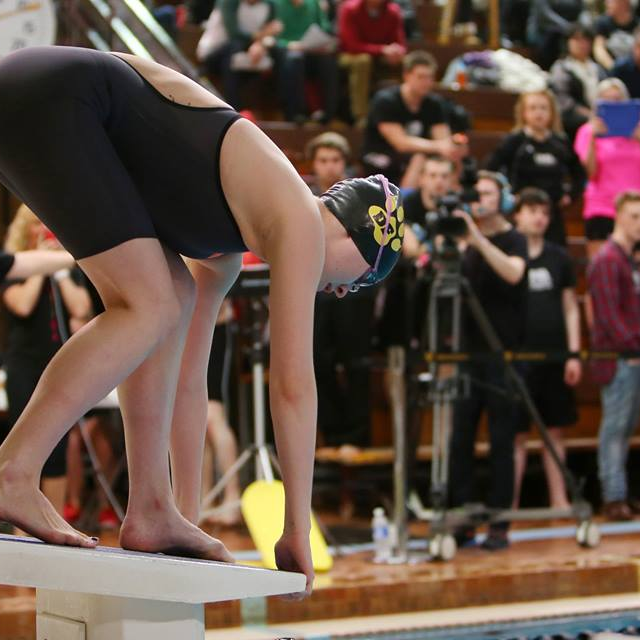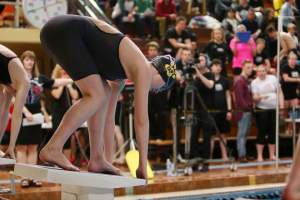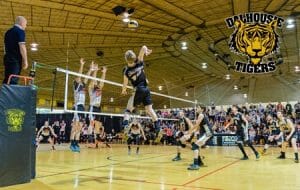
Dal athletes keep a balanced lifestyle
Dal athletes are busy: training, doing schoolwork, performing in competitions and having a social life. Harrison Callaghan and Julia Sarty shared how they deal with all of it.
Dalhousie University athletes work tirelessly to represent their school. How do these high-performing athletes manage to balance their academia, training and social life? The Gazette talked to two athletes about how they manage this.
Harrison Callaghan is in his third year playing the position of left side on the men’s volleyball team. Off the court, Callaghan studies medical science, runs an Airbnb out of his parents’ place in Bedford, and is involved with Dalhousie’s Best Buddies chapter.
Julia Sarty is a third-year swimmer from Halifax. She studies electrical engineering at the Sexton campus and because of her program, she’s taking six courses this semester.

Sarty on the starting block.
How many hours a week do you dedicate to your sport?
Callaghan: “The on-court training is about three-and-a-half hours per day besides Monday. Just working out, we do two hours a week. There are also various extra things we do as well such as team bonding sessions.”
Sarty: “Our schedules are accommodating in the fact nothing is really going on so early in the morning. Assuming no one has a class at 6:00 a.m., it’s easy to fit in a workout then. So with morning and afternoon practices, we can fit in eight to ten hours per week without taking away time to be in class, eat, or whatever else we need to do.”
Where do you find the time to study?
Callaghan: “There is a mandatory study time for first year students organised by Dal athletics. The mandatory two hours in the Killam Library every Monday helps first year students transition to fit the university lifestyle. The study time is also mandatory for students whose GPA has dropped below a certain threshold. After first year, if you can show that you can [balance athletics with school,] then it’s not a required study hall.”
Sarty: “My life is very structured. I have to know where I’m going to be at all times of the day in order to fit everything in that I need to do. For example, today I know I need to go to class between 8:30 a.m. and 2:30 p.m., and then get on the bus right away, go to the Dalplex, swim, eat, and then go to the library to study. There’s no leeway, if I don’t get through all the things, then I kind of miss out on one of the things I was supposed to do.”

Callaghan goes in for the spike.
How do you maintain a healthy diet?
Callaghan: “My focus towards my nutrition is getting rid of the processed stuff [and] getting rid of fake foods – I haven’t eaten fast foods in a while! Managing what foods get home, in the cupboards, help me manage my ‘vulnerable’ states of hunger so that I have healthy foods to snack on, such as fruit.”
Sarty: “We burn a lot of calories swimming, so some people find it hard to find the time to eat within appropriate time frames. I’m notoriously bad at this, but a lot of people are good at making sure the only thing that they are focused on when they get out of the pool is getting home as fast as they can so that they can eat and move on with their day. A lot of swimmers use meal plans. You can find a lot of upper-year swimmers sitting with residence students almost every day.”
Do you party at all?
Callaghan: “No.”
Sarty: “It has to fit to whatever cycle I’m on with school and sports so that I can avoid harming my performance. Usually, there is a window in November to kind of let loose. But I do partake – responsibly – in the consumption of alcohol. Varsity sports sometimes has the culture of work hard, play harder and swimming isn’t exempt from that lifestyle, but we do have a longer dry-season and less time to go out.”
Any final words?
Callaghan: “My message, to the more general reader who is feeling stressed out of their mind regarding time management, is that in my life, when volleyball can get really busy, it’s good to have stuff to do besides school. I think it’s important for people to get involved in a commitment with sports so they have a scheduled amount of exercise, but also it’s a brain refresher for school.”
Sarty: “It’s not easy to try and balance school with athletics. It is definitely a privilege to be swimming for Dal. You’re a student-athlete, not just a student and not just an athlete. Swimming for Dal is the best decision ever!”






